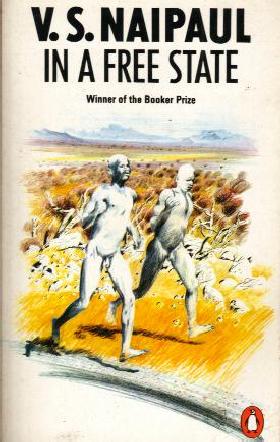
V.S. Naipaul
The following novels constitute the shortlist for the 1971 Booker Prize:
Notable Omissions from the 1971 Shortlist

|
In a Free State V.S. Naipaul |
Dustjacket synopsis:
"This is a sequence, part fiction, part documentary, and at its heart is a novel of great brilliance.
"The novel is set in a free state of Africa at a time of civil conflict when a once-ruling tribe is being decimated. But for English people like Bobby and Linda, driving back from the capital to their expatriates' compound, the roads are open. Neutral, white, protected, they have both in their different ways found liberation in Africa, and they too might be said to be 'in a free state'. But their neutrality will not last; there is a danger on the open road.
"Exploiter and exploited: it is one of the conditions of life in a free state that the roles should ceaselessly shift. Ths is not the Africa of romance or 'servce', but something infinitely more ambiguous."
Quotes:
"I consider Naipaul the finest living novelist writing in English, and this his most important work." - Francis Wyndham,
The Listener
First Paragraph:
It was only a two-day crossing from Piraeus to Alexandria, but as soon as I saw the dingy little Greek steamer I felt I ought to have made other arrangements. Even from the quay it looked overcrowded, like a refugee ship; and when I went aboard I found there wasn't enough room for everybody.
There was no deck to speak of. The bar, open on two sides to the January wind, was the size of a cupboard. Three made a crowd there, and behind his little counter the little Greek barman, serving bad coffee, was in a bad mood. Many of the chairs in the small smoking-room, and a good deal of the floor space, had been seized by overnight passengers from Italy, among them a party of overgrown American schoolchildren in their mid-teens, white and subdued but watchful. The only other public room was the dining-room, and that was being got ready for the first of the lunch sittings by stewards who were as tired and bad-tempered as the barman. Greek civility was something we had left on shore; it belonged perhaps to idleness, unemployment and pastoral despair.
From the Penguin paperback edition, 1987.
|
The Big Chapel Thomas Kilroy |
I haven't seen a copy of this book, and know nothing about it.
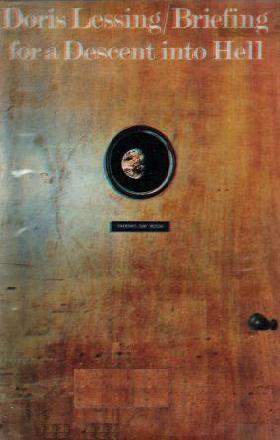
|
Briefing for a Descent into Hell Doris Lessing |
Dustjacket synopsis:
"Doris Lessing's new novel - which she defines as 'inner space fiction' - is an incomparably exciting voyage into the
marvellous, terrifying, unexplored, yet sometimes glimpsed territory of the inner man.
"Professor Charles Watkins (Classics), doomed to spin endlessly in the currents of the Atlantic, makes a landfall at last on a tropical shore. He discovers a ruined stone city, participates - moon-dazed - in bloody rituals in the paradisiacal forest, witnesses the savage was of the Rat-dogs and is borne on the back of the lordly White Bird across the sea of the dead. Finally, the crystal claims him, whirling him out into space on a breathtaking cosmic journey.
"Yet this most exotic of trips is as firmly rooted in the reality of a mental breakdown as De Quincey's fantasies were in the chemistry of opium. Watkins is a patient of Central Intake Hospital, an enigma to the doctors who try with ever more powerful drugs to subdue his mind's adventure, a candidate for electric shock treatment. In a series of extraordinary letters - brilliantly illuminating both the writers and their subject - Watkins is reconstructed by those who have known him: the forgotten women who have loved him, or been awakened by him; the pedant, incensed by his intellectual anarchy; the wartime colleague around whose exploits with the Yugoslav partisans Watkins builds an astonishing fantasy.
"Doris Lessing believes that society's treatment of the mentally ill is civilization's biggets and blackest blind spot, and that it is through the minds of the 'broken-down' that truths we shose to shut out enter like the disguised messengers in myths and fairy tales. Developing themes central to The Golden Notebook and The Four Gated City, this book is her most astounding imaginative achievement - a rare work which explores new areas of thought."
First Paragraph:
CENTRAL INTAKE HOSPITAL
Admittance Sheet Friday, August 15th, 1969
Name ... Unknown
Sex Male
Age Unknown
Address ... Unknown
General Remarks
... At midnight the police found Patient wandering on the Embankment near Waterloo Bridge. They took him into the station
thinking he was drunk or drugged. They describe him as Rambling, Confused and Amenable. Brought him to us at 3 a.m. by
ambulance. During admittance Patient attempted several times to lie down on the desk. He seemed to think it was a
boat or a raft. Police are checking ports, ships, etc. Patient was well-dressed but had not changed his clothes for some
time. He did not seem very hungry or thirsty. He was wearing trousers and a sweater, but he had no papers or
wallet or money or marks of identity. Police think he was robbed. He is an educated man. He was given two Libriums but
did not sleep. He was talking loudly. Patient was moved into the small Observation ward as he was disturbing
the other Patients.
NIGHT NURSE 6 a.m.
From the Jonathan Cape hardback edition, 1971.
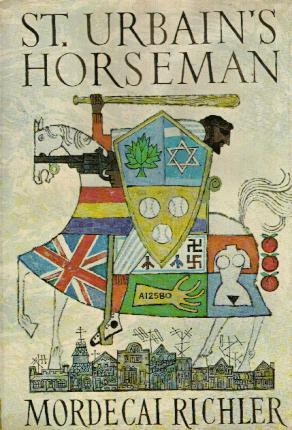
|
St. Urbain's Horseman Mordecai Richler |
Dustjacket synopsis:
"Large, real, and surreal - crowded with characters, deeply felt, alive with wit, moving fluently from scene
to splendid scene of courtroom sensation, of domestic bliss and nervousness, of search for a man vanished,
of family intrigue, of professional triumph and panic (and of unforgettable double plays at the great movie
moguls' Hampstead Heath Sunday Morning Softball Game, where abandoned and alimonied first wives come to hiss) -
St. Urbain's Horseman gives pleasure after pleasure as it brings richly alive a unique and familiar
man of our time. He is a man on trial.
"At the moment when the sky falls on him, Jake Hersh is thirty-seven, a near-rich, near-famous film and TV director living millionairishly in London and loving it - a life that is worlds away from the all-poor, all-Jewish St. Urbain's Street in Montreal, where he was raised admist a clamor of Hershes both terrible and wonderful. He is still, night and day, after ten years madly in love with his beautiful gentile wife, Nancy. He is the adoring father of three blooming exemplars of the new breed of mixed-marriage kids who belong everywhere, with a stake in Jehovah and a claim on Christ. He is a Success.
"Fortunate man. What is it, then, that has drawn him, however reluctantly, to friendship with that compulsive failure Harry Stein, nasty little accountant who makes obscene telephone calls to movie stars?
"What is it that has kept Jake, over the years, worshipping and ever searching for his long-lost cousin Joey - Joey the Avenger on Horseback, missing since eighteen, now perhaps in Paraguay on the trail of the notorious Dr. Mengele, perhaps single-handedly defending an Israeli outpost, recognized for an instant galloping across the screen of a Hollywood Western...
"What is it that has brought Jake to his present appalling and ridiculous crisis: this paterfamilias and man of sensibility is now, incredibly (and to the delight of the sensational press), a prisoner in the dock at the Old bailey, accused of an unspeakable crime by Ingrid, blonde, concupiscent German au pair girl...
"Is he guilty? And what is he guilty of? The whole texture of a life being lived is conveyed in Richler's complex, moving, and wonderfully comic evocation of a generation consumed (sometimes) with guilt - guilt at not joining every battle, at not healing every wound, guilt at not riding hell-for-leather to the rescue of all, side by side with the Avenger himself, St. Urbain's Horseman."
First Paragraph:
Sometimes Jake wondered if the Doktor, given his declining years, slept with his mouth open, slack, or was it (more characteristically, prhaps) always clamped shut? Doesn't matter. In any event, the Horseman would extract the gold fillings from the triangular cleft between his upper front teeth with pliers. Slowly, Jake thought, coming abruptly awake in a sweat. "He's come," Jake proclaimed aloud.
Beside him, Nancy stirred.
"It's nothing," Jake said softly. "Just the dream again. Go back to sleep."
The Doktor was reputed to keep armed bodyguards, maybe four of them. Certainly he kept a weapon handy himself. Say a service revolver tucked under his pillow or an automatic rifle leaning against a wall in his villa with the barred windows off an unmarked road in the jungle, between Puerto San Vincente and the border fortress of Carlos Antonio López, on the Paraná River. Even that doesn't matter, Jake thought. St. Urbain's Hoseman will take him by surprise, gaining the advantage.
From the Knopf hardback edition, 1971.
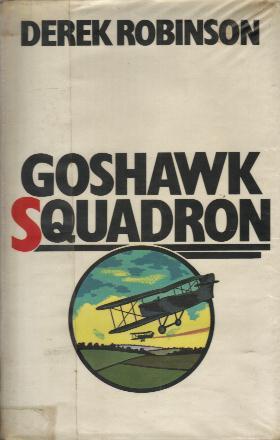
|
Goshawk Squadron Derek Robinson |
Dustjacket synopsis:
"Goshawk Squadron, R.F.C., January 1918. The C.O., Woolley, indoctrinates his pilots with a simple yet savage code: shoot
the enemy in the back before he knows you're there - a briskly cold blooded approach to the business of air warfare
and far removed from the romance of 'chivalry in the clouds'. Even so, he believes in three months the whole squadron
will be dead. Scruffy and a perpetual Guinness-drinker, he trains his flyers with a measured mixture of sarcasm and
brutality. Planes fly, crash, are patched with canvas, lubricated with castor oil, and fly again. 'We eat death for
bloody breakfast,' Woolley says. 'It's what keeps us going.'
"Surprisingly this first novel set in the last year of a catastrophic war is not only shocking and exciting but a very funny book. Woolley may drive his men but he terrorizes the top brass; and with his girlfriend Margery he is something else again. Derek Robinson's portrait of this wild old man of twenty-three is an extraordinary success."
First Paragraph:
January 15 1918 was a cold, sparkling, sunny day. Not much happened in the Great War that day. As usual, about two thousand men (of the millions along the Western Front) died; some because they stuck their heads up too high and got shot; some because they got their feet wet too often and caught pneumonia; many by accident; and a steady few by their own hand. It was one thousand two hundred and sixty days since Britain and Germany had declared war. Not that anyone was counting.
Pont St Martin was an isolated airfield, far behind the front lines. At 11.45 a.m. Goshawk Squadron, R.F.C., was preparing to land there for the first time. Twelve SE5a biplanes - squared-off machines with wings like box kites and tails like weathervanes - were spaced out in line-asterneasing down in a wide sweep towards the field, which was still white with frost under the baby-blue sky.
In the middle of the field, Stanley Woofley sat in a deckchair and watched them. At twenty-three he was young for a major and old for a pilot. His face looked wrong for either: bad-tempered and stony, heavy-lidded, with a miserable complexion. The newspapers had tried retouching his photograph but it wasn't any better, and in any case they couldn't retouch Woofley himself. The last journalist to try to get an interview had started by asking if his men had a pet nickname for him; Woolley had kicked him painfully up the arse. There was no story for the newspapers in Woolley. He was a veteran, he was successful, he had led Goshawk Squadron for over a year, and still they could do nothing with him. They felt badly let down by Woolley.
From the Heinemann hardback edition, 1971.
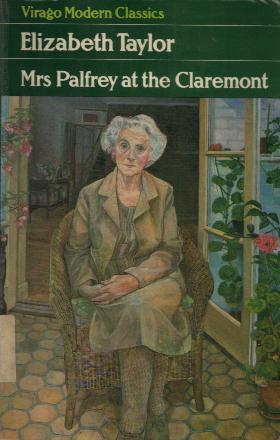
|
Mrs Palfrey at the Claremont Elizabeth Taylor |
Dustjacket synopsis:
"'Ludo thought of the man, her husband who had had to woo her in those far-off days, and wondered at his courage. The
spirit of the Empire-builders. He'd gone batting on, undaunted, and got someone brave and staunch.'
"One rainy Sunday in January Mrs Palfrey, recently widowed, arrives at the Claremont Hotel in the Cromwell Road. Here she will spend her remaining days. Her fellow residents are a magnificently eccentric group who live off crumbs of affection, obsessive interest in the relentless round of hotel meals, and undying curiosity. There is Mrs Burton with her mauve-rinsed hair, her costume jewellery and her drinking; Mrs Arbuthnot, bossy and arthritic; Mr Osmond with his risque stories, his endless stream of letters to the press. Together, upper lips stiffened, teeth gritted, they fight off their twin enemies: boredom and the grim Reaper. And then one day Mrs Palfrey encounters the handsome young writer, Ludo, and we learn that even the old can fall in love..."
First Paragraph:
Mrs Palfrey first came to the Claremont Hotel on a Sunday afternoon in January. Rain had closed in over London, and her taxi sloshed along the almost deserted Cromwell Road, past one cavernous porch after another, the driver going slowly and poking his head out into the wet, for the hotel was not known to him. This discovery, that he did not know, had a little disconcerted Mrs Palfrey, for she did not know it either, and began to wonder what she was coming to. She tried to banish terror from her heart. She was alarmed at the threat of her own depression.
If it's not nice, I needn't stay, she promised herself, her lips slightly moving, as she leaned forward in the taxi, looking from side to side of the wide, frightening road, almost dreading to read the name Claremont over one of those porches. There were so many hotels, one after the other along this street, all looking much the same.
She had simply chanced on an advertisement in a Sunday newspaper while staying in Scotland with her daughter Elizabeth. Reduced winter rates. Excellent cuisine. We can take that with a pinch of salt, she had thought at the time.
From the Virago Modern Classics paperback edition, 1982.
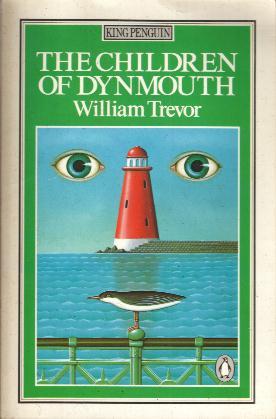
|
The Children of Dynmouth William Trevor |
Dustjacket synopsis:
"A small, pretty seaside town is harshly exposed by a young boy's curiosity. His prurient interest, oddly motivated,
leaves few people unaffected - and the consequences cannot be ignored."
Quotes:
"First rate" - Robert Nye, Guardian
"A very fine novel...the work of a master craftsman and a deep creative talent" - Peter Tinniswood, The Times
"A master of persuasive realism who commands a graphic style to match it...He has surpassed himself in simplicity of
structure, fertility of invention, ruthless characterization and diabolical humour" - Sean O'Faolain, Irish Press
First Paragraph:
Dynmouth nestled on the Dorset coast, gathered about what was once the single souce of its prosperity, a small fishing habour. In the early eighteenth century it had been renowned for its lacemaking and its turbot, and later developed prettily as a watering place. Being still small, it was now considered unspoilt, a seaside resort of limited diversions, its curving promenade and moset pier stylish with ornamental lamp-posts, painted green. At the foot of grey-brown cliffs a belt of shingle gave way to the sand on which generations of Dynmouth's children had run and played, and built castles with moats and flag-poles.
From the King Penguin paperback edition, 1982.
Notable Omissions from the Shortlist:
"Love Child", Maureen Duffy
"Maurice", E.M. Forster
"Strange Meeting", Susan Hill
"Riotous Assembly" Tom Sharpe
"Black List, Section H", Francis Stuart
This page and its contents are copyright © 2002 by Perry Middlemiss, Melbourne, Victoria, Australia.
Last modified: April 17, 2002.